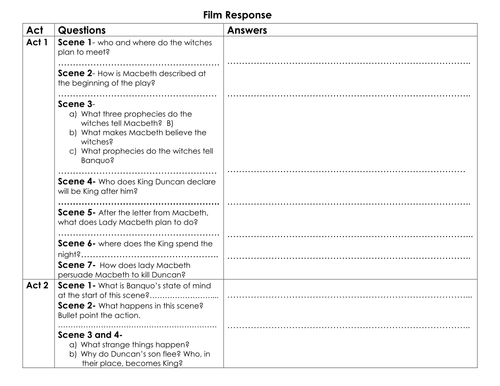Macbeth Act 2 And Study Guide Answers
Act 2, scenes 3–4 Summary: Act 2, scene 3 A porter stumbles through the hallway to answer the knocking, grumbling comically about the noise and mocking whoever is on the other side of the door. He compares himself to a porter at the gates of hell and asks, “Who’s there, i’ th’ name of Beelzebub?” (2.3.3).
Macduff and Lennox enter, and Macduff complains about the porter’s slow response to his knock. The porter says that he was up late carousing and rambles on humorously about the effects of alcohol, which he says provokes red noses, sleepiness, and urination. He adds that drink also “provokes and unprovokes” lechery—it inclines one to be lustful but takes away the ability to have sex (2.3.27). Macbeth enters, and Macduff asks him if the king is awake, saying that Duncan asked to see him early that morning.
Macbeth Act 2 Reading And Study Guide Answers
2018 katana gsxf 750 service manual. In short, clipped sentences, Macbeth says that Duncan is still asleep. He offers to take Macduff to the king. As Macduff enters the king’s chamber, Lennox describes the storms that raged the previous night, asserting that he cannot remember anything like it in all his years. With a cry of “O horror, horror, horror!” Macduff comes running from the room, shouting that the king has been murdered (2.3.59). Macbeth and Lennox rush in to look, while Lady Macbeth appears and expresses her horror that such a deed could be done under her roof. General chaos ensues as the other nobles and their servants come streaming in. As Macbeth and Lennox emerge from the bedroom, Malcolm and Donalbain arrive on the scene.

They are told that their father has been killed, most likely by his chamberlains, who were found with bloody daggers. Macbeth declares that in his rage he has killed the chamberlains. Macduff seems suspicious of these new deaths, which Macbeth explains by saying that his fury at Duncan’s death was so powerful that he could not restrain himself.
Lady Macbeth suddenly faints, and both Macduff and Banquo call for someone to attend to her. Malcolm and Donalbain whisper to each other that they are not safe, since whoever killed their father will probably try to kill them next. Lady Macbeth is taken away, while Banquo and Macbeth rally the lords to meet and discuss the murder. Duncan’s sons resolve to flee the court. Malcolm declares that he will go south to England, and Donalbain will hasten to Ireland.
Summary: Act 2, scene 4 Ross, a thane, walks outside the castle with an old man. They discuss the strange and ominous happenings of the past few days: it is daytime, but dark outside; last Tuesday, an owl killed a falcon; and Duncan’s beautiful, well-trained horses behaved wildly and ate one another. Macduff emerges from the castle and tells Ross that Macbeth has been made king by the other lords, and that he now rides to Scone to be crowned. Macduff adds that the chamberlains seem the most likely murderers, and that they may have been paid off by someone to kill Duncan. Suspicion has now fallen on the two princes, Malcolm and Donalbain, because they have fled the scene. Macduff returns to his home at Fife, and Ross departs for Scone to see the new king’s coronation.

Analysis: Act 2, scenes 3–4 After the bloody imagery and dark tone of the previous two scenes, the porter’s comedy comes as a jarring change of tone. His good-natured joking with Macduff breaks up the mounting tension of the play and also comments obliquely on its themes. Unlike all the characters of noble birth, who speak in iambic verse, the porter speaks in prose. His relaxed language seems to signal that his words and his role are less important than those of the other characters, but in his merry banter the porter hits on many truths.
His description of the confusion and lust provoked by alcohol caricatures Macbeth’s moral confusion and lust for power. Moreover, his remarks about the ineffective lechery inspired by drink eerily echo Lady Macbeth’s sexual taunting of Macbeth about his ability to carry out his resolutions. The porter’s joke that the door of Inverness is like hell’s gate is ironic, given the cruel and bloody events that are taking place within the castle. When he cries, “Who’s there, i’ th’ name of Beelzebub the devil?” the analogy between hell and Inverness becomes even stronger (2.3.3). Instead of receiving a welcome and a blessing when they step into Macbeth’s castle, guests are warned that they are putting themselves in the hands of the devil.
Now that Lady Macbeth’s machinations have wrought their result, Lady Macbeth begins to recede from center stage and Macbeth takes her place as the most compelling character in the play. The clipped, halting sentences with which Macbeth speaks to Macduff and Lennox indicate his troubled mind and trepidation about the impending discovery of Duncan’s body. For example, while Lennox offers a lengthy speech about the wild weather of the previous night, Macbeth’s only response is a terse “ ’Twas a rough night” (2.3.57).
And when Lennox asks Macbeth, “Goes the King hence today?” Macbeth almost gives away his knowledge that Duncan is dead (2.3.49). “He does,” answers Macbeth, before he realizes that his answer is incriminating and changes it to: “He did appoint so” (2.3.49).
Once Duncan’s body is discovered, it is as though a switch has been flipped within Macbeth. He springs into action with a clear eye toward his purpose, seizing control of the nobles and becoming King of Scotland. Interestingly, Shakespeare does not show us the scene in which Macbeth is made king. Just as he denied us the scene of Duncan’s murder, he now skips over its most direct consequence, Macbeth’s election. The news is conveyed secondhand through the characters of Ross, Macduff, and the old man.